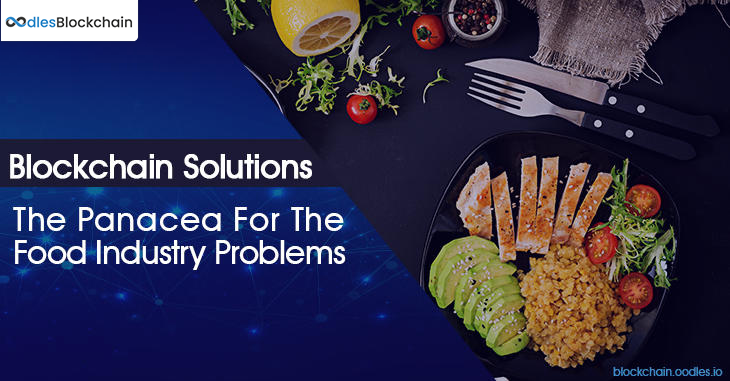-
In the current food supply chain landscape, adulteration is one of the safety concerns that hinder the development of the food industry on a global scale. Food that we consume processes through many touchpoints starting from a farmer to end consumers. The rapidly increasing complexity of the existing global food supply chain has made it almost impossible to track the provenance of food products.
So, how can we ensure that the food we consume is not of the sub-standard quality? - The answer is, by using building solutions using blockchain supply chain solutions.
Blockchain for Food
As we know, blockchain is all set to provide an open platform having no intermediaries, and a set of conditions (rules) that all participants must follow. The technology can prove to be beneficial for complex supply chain enhancement. It can prove to be invaluable in the food industry that faces the most trust and compliance issues. It brings advantages to every stakeholder within the supply chain of the Food Industry- producers, retailers, and consumers.
For instance, if someone tries to alter a food product anywhere within the supply chain, blockchain solutions would instantly find it and alert the food producer before it reaches a retailer.
Also, Explore | Developing a Food Delivery App like UberEats with Blockchain
Blockchain provides retailers with the advantage of finding the altered products that may reach the shelves. It eradicates the need for batch recalls, which prove to be extremely costly for the producer of the product many times. On the consumers' part, it ensures that they eat the right food!
Using the advantages of a blockchain, proper details of a food product could reach the hands of a customer. At the point of sale, consumers can scan the QR code printed on a food product using a smartphone and track a log of the journey of that item from "production to fork."
Blockchain stores and assigns a digital key (certificate) for each food item interaction. This abates the chances of food adulteration. Also, companies that will use blockchain for Food or become early adopters of blockchain-based food solutions will ensure a stronger and more loyal customer base.
You may also like | Blockchain in Supply Chain | Tracing From Food to Healthcare
Blockchain Solutions Development for the Food Industry
The myriad of opportunities offered by blockchain technology in the food industry has evoked the interest of some of the established players in the retail and technology landscape. Walmart and IBM have partnered to streamline the way food items are being tracked, transported, and delivered to customers. They plan to digitalize the tracking of food products from farms to stores of Walmart and ultimately to customers, including food information such as batch numbers, provenance details, expiry dates, shipping details, manufacturing and processing data, and the entire food supply chain. Walmart and IBM have planned to use blockchain solutions to reduce wastage, cut down logistics costs, deliver food to stores more quickly, and efficiently manage product shelf life.
Also Read: Analyzing the Food Traceability System Developed by Walmart with Hyperledger Fabric
Conclusion
Using blockchain can add a thick layer of security in the increasingly expanding market. And the demand of the hour is asking for improved traceability. Therefore, the opportunity is fitting for the food industry and technology to come together. With blockchain for Food, it can become possible for retailers to sell right and consumers to eat right.
Interested in developing a food traceability system for your supply chain? Connect with our blockchain developers to get started.

Our Offices
INDIA
Emaar Digital Greens, Sector 61,
Gurugram, Haryana
122011.
Welldone Tech Park,
Sector 48, Sohna road,
Gurugram, Haryana
122018.














